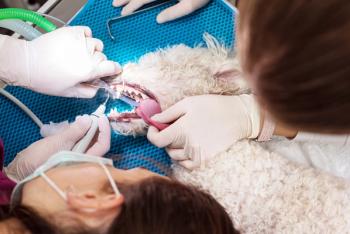
The real value and cost of mentorship
Many new graduates are not ready or able to reach productivity that will make them profitable to employers.
It is hard to put a price tag on mentorship, but it can be a money-saving strategy for practice owners and the crown jewel in a new graduate's benefit package.
According to the U.S. Department of Labor, the number of veterinarians employed in the United States is expected to increase at a higher rate than the average for all U.S. occupations during the next seven years. The demand for associates indicated by this report will be occurring while the average career length per associate is decreasing. Logically, this situation will result in an increase in the hiring of associate veterinarians who have practiced for a relatively short period of time.
Therefore, progressive practice owners must determine how they will address the heightened probability that the next associate they hire will be a recent veterinary school graduate. Will this development mean that owners can expect an influx of cheap labor? Don't get your hopes up. The labor market might be inexperienced, but not cheap.
Changing times
The demands and requirements that new graduates place on prospective employers are changing. To this point, practice owners have largely relied on hiring incentives that have been most effective in the past (i.e. salary, time off, CE and health insurance). However, practice owners who continue to compensate using only traditional methods may soon find that increasing these incentives is costly, ineffective and frustrating.
18 month Mentor/Employment Contract Program
According to the Dec. 1, 2004 and the Jan. 15, 2000 editions of JAVMA, the mean starting salary for 2004 graduates entering private practice was $49,635 compared to $38,533 in 1999. This difference represents a 29-percent increase in starting salaries during the last five years compared to a 13.5-percent increase in the most commonly used Consumer Price Index during the same period. Also, approximately 53 percent of 2004 graduates entering private practice reported receiving additional compensation at an average value of $7,454 compared to 30 percent of 1999 graduates receiving additional compensation with an average value of $5,625. The average dollar value of additional compensation packages when spread across all graduates would thus be $3,951 per graduate in 2004 and $1,688 per graduate in 1999. The average additional compensation amount per new graduate has thus risen 134 percent since 1999. Put simply, the amount of money practice owners must offer to attract new graduates is going up fast.
Why is this situation developing? The reasons are numerous. At a theoretical level, the growth of all practices is in part limited by their ability to expand their veterinary staffs. A general shortage of veterinarians can therefore push up starting salaries through simple supply and demand. Veterinarians seeking employment are in high demand from expanding veterinary practices, and as a result, the majority of new graduates (52.6 percent of 2004 graduates according to the same 2004 JAVMA survey) have multiple job offers. Consequently, competition to hire new associates may push starting salaries above the attainable production levels typical of new graduates.
Dr. Gerald Snyder's "Rule of 45" states that no more than 45 percent of the gross revenues for a veterinary practice should be spent on veterinarian, support staff and management salaries combined. The most common benchmark for total support staff salaries is 20-22 percent of gross revenues with another 3-4 percent allocated to management. Thus, if we accept the rule of 45, veterinarian salaries should comprise no more than 19-22 percent of gross revenues. Given the desire of many practice owners to attract and retain clinical and non-clinical staff members during this time of rising salary and benefit costs, one can easily see how the addition of an associate could push a clinic, even one experiencing moderate to rapid growth, well into a violation of the Rule of 45.
Generally speaking, if an associate does not increase the practice's gross income by an amount equal to five times his or her salary, then this associate's presence will detract from the profitability of the clinic. Many new graduates are not ready or able to enter the work force with the level of productivity required to make themselves profitable to their employers. As a result, practice owners may find themselves frustrated that the productivity of these recent graduates cannot increase gross production to levels that justify the salaries required to hire them.
The progression of some new graduates (and a few seasoned associates) toward profitability may be slowed by obstacles outside the realm of clinical experience. Although business education is expanding within veterinary schools, due largely to the efforts of student groups like the national Veterinary Business Management Association (VBMA) and corporate sponsorship of business courses (primarily from Hill's, VPI and Novartis), some recent graduates simply do not understand the inherent relationship between practice success and gross production.
Also, young associates may be unwilling to assess established fees due largely to a lack of (1) knowledge about the value of their time and (2) confidence in their own abilities (i.e. "I know I took four radiographs, but the other veterinarians would have probably only needed two. Our clients shouldn't pay for my inexperience."). These veterinarians simply experience "atrophy of the right arm" when it is time to produce the bill. Their productivity and the practice's average client transaction (ACT) value suffer as a result.
Adding to practice-owner frustration is disappearance of the "career employee." Veterinarians, like practitioners in other professions, are becoming increasingly transient in their employment. Patient practice owners who accept losses while biding their time and waiting for recent graduates to become productive may be in for a nasty surprise. Investing competitive salaries and benefits in recent graduates who may depart shortly after honing their skills is a proposition that can keep practice owners awake at night.
Don't hate the player; hate the game. The vast majority of new graduates want to be valuable to their employers. They want to be popular among clients, champions among staff, and a point of pride among the partners. New graduates as a whole have no intention of financially crippling a struggling practice owner or laughing all the way to the bank.
Yet, no one wants to be "taken advantage of." The reluctance of new employees to accept a salary below what their friends have received or what they have been offered by other potential employers is completely logical and understandable. For recent graduates, the desire to avoid being victimized is often coupled with a favorable associate supply/demand ratio and the fact that, according to JAVMA, 88 percent of new graduates are in debt an average of $81,052 (a 28-percent increase from the $63,089 average debt level in 1999). Under these circumstances, the tendency of new graduates to seek maximal compensation for their time is a no-brainer. Note that average debt for all graduates climbing at nearly double the rate of average salary between 1983 and 2004.
The question then becomes "how can practice owners compete to hire new graduates, make these new employees profitable and, finally, retain them once their skills have developed?" The answer may lie in a contractual mentorship program.
Mentorship programs
As the old saying goes, "Money isn't everything." As starting salaries climb to levels that cannot be supported by many practice owners, it becomes necessary to evaluate and/or create non-monetary forms of compensation. If an owner can identify and provide a unique service of high value to an applicant, then the applicant may not view salary as the sole criterion with which to evaluate an employment opportunity. Interestingly, DVM Newsmagazine's October 2004 survey reported that the most common issue cited by all veterinarians as being important for success was "training," while the AVMA-Pfizer study published in the Jan. 15, 2005 issue of JAVMA reported that "employee development" was the business practice most strongly correlated with high income. The recent establishment of a national mentorship program by the AVMA is further evidence of the prevalence of this sentiment. We all comprehend the necessity for trade-offs (you can't get something for nothing), and for many new graduates, the value of education in the form of a mentorship might be equal to or greater than that of cash.
An increasing desire for mentorship appears fueled by a wealth of both new and classic concerns. These concerns include the rise of malpractice issues and state board complaints, and the logistically unwieldy application process involved in applying for the American Association of Veterinary Clinicians' (AAVC) Veterinary Internship and Residency Matching Program (VIRMP). New graduates may also be financially bound to start a "real job" since the average starting salary in an advanced study program (internship/residency) in 2004 was just $24,000 (48 percent of the mean starting salary in private practice). This salary is entirely inadequate for those new graduates with merely average educational debt who will be unable to pay off their educational loans and make a living during this low compensation internship year. Individuals falling into these categories therefore bypass internships hoping to find similar experiences with better pay as associate veterinarians.
By identifying and addressing an applicant's desire for mentorship, a creative practice owner might escape, or at least minimize, many of the hazards commonly associated with hiring new graduates. However, even the youngest veterinarians are experienced enough in the study of human nature to recognize that accepting promises of mentorship and "quality time" in lieu of higher guaranteed salaries is a risky proposition. Therefore, in order to convert promises of mentorship into benefits of measurable value, a formalized mentorship package can and should be worked into the employment contract.
Consider a program
For practice owners, formalized mentorship programs may offer rewards beyond a simple reduction in dollar expenditures during the time when new graduate production is certain to be lowest. These programs may build confidence in new graduates, making them more comfortable with their skills, the burden of legal liability and the practice's designated fee schedule. A mentorship program will also be useful in establishing lines of communication between new employees, mentors and existing staff members. As a result, new graduates may learn how to more effectively and appropriately communicate with colleagues and support staff (assuming that their mentors have mastered this skill). Establishment of improved intra-practice communication ensures senior associate veterinarians (or practice owners themselves) the benefit of a new graduate's enthusiasm, knowledge of technology and new techniques.
Commitment to a mentorship program represents an emotional as well as a time and financial investment in employees by practice owners. This gesture may encourage new employees to reciprocate by making a similar emotional investment that is later expressed in the form of loyalty and appreciation. Furthermore, mentorship can provide a way to get new graduates interested and engaged in the clinical and business aspects of the practice from the very beginning. Mentorship brings new employees into the "inner circle" of the practice and may, thus, bond new team members to their mentors and also to the support staff. This bond and a mutual commitment between employers and employees may lead to a more rewarding experience for both and an increased duration of employment for new graduates.
Before continuing, it should be pointed out that effective mentorship is not always a possibility. It requires patient veterinarians who enjoy mentoring/teaching and an understanding by owners/mentors and new graduates that the employees being mentored will not be as productive as other veterinarians. New graduates must also accept how mentorship must impact their salaries and understand exactly what they will receive in return. To be seriously considered as a form of compensation, specific guidelines regarding mentorship must therefore be put forth as a contractual, formal employment benefit and then maintained. See sidebar for an example of a three-step, 18-month program to guide the creation of a formalized mentorship contract.
Final considerations
The creation and implementation of a formalized mentorship program can be a unique and synergistic opportunity for practice owners, senior associates and new graduates. There are, however, considerations that must be made to ensure that both parties will reap the benefits of such a program.
1) Quality mentorship takes time on the part of all mentors. A potentially negative impact on the production level of mentors must be considered, especially if they are not the practice owners.
2) Mentees must have respect for mentors, the belief that this experience is valuable and the desire to learn.
3) Helping new graduates understand the rationale and value accompanying Stage 1 and 2 salary reductions is vital. If this logic is not clearly explained, then the likelihood of hiring a happy new graduate may be decreased significantly.
4) Restrictive covenant (do not compete) clauses can be devastating to new graduates if employment doesn't work out during the mentorship period. However, such a clause should be present and structured to protect the practice owner from abuse of the mentorship program by a mentee who makes a premature departure. With that in mind, to be fair to both parties, this clause should take effect only after the end of Stage 1.
5) Choosing a compatible and motivated mentor is critical. Good mentors should learn from young associates and embrace new ideas and information. They must value their mentees' time as much as their own and schedule make-up shadow and review sessions when needed. Good mentors should understand and be willing to explain the surgical, medical, ethical, legal and financial ramifications of their cases. They should also be supportive during the mentee's growth, tactful when teaching or coaching, and thrilled (not threatened) by the success of their charge. Good mentors embrace their role in the development of young veterinarians, provide honest and constructive criticism in the form of written evaluations, and record highlights from shadow sessions for discussion during review periods. Mentors are hoping their actions will be mimicked, which means their behaviors must be worthy of replication.
Conclusion
Implementing a controlled mentorship program will not be easy. Moreover, it may not be possible in some practices because of a busy schedule, a high volume of difficult cases, or an incompatibility between the personalities of the mentor and the mentee. However, for practices with the resources, desire and creativity required to make mentorship a legitimate form of compensation, a formalized mentorship program can protect profitability, stimulate the intellect of experienced veterinarians, and facilitate a long and productive relationship with young veterinarians.
The effort associated with implementing a mentorship program may be rewarded with the presence of a more seasoned new associate on staff, an improved intra-practice atmosphere, a decreased associate turnover rate, a happier clientele, and ultimately, with a higher quality of medicine, patient care and client communications.
Mr. Roark is a second-year veterinary student at the University of Florida.
Dr. Wilson, of Priority Veterinary Consultants in Yardley, Pa., is a nationally recognized speaker and author on animal law.
Newsletter
From exam room tips to practice management insights, get trusted veterinary news delivered straight to your inbox—subscribe to dvm360.




